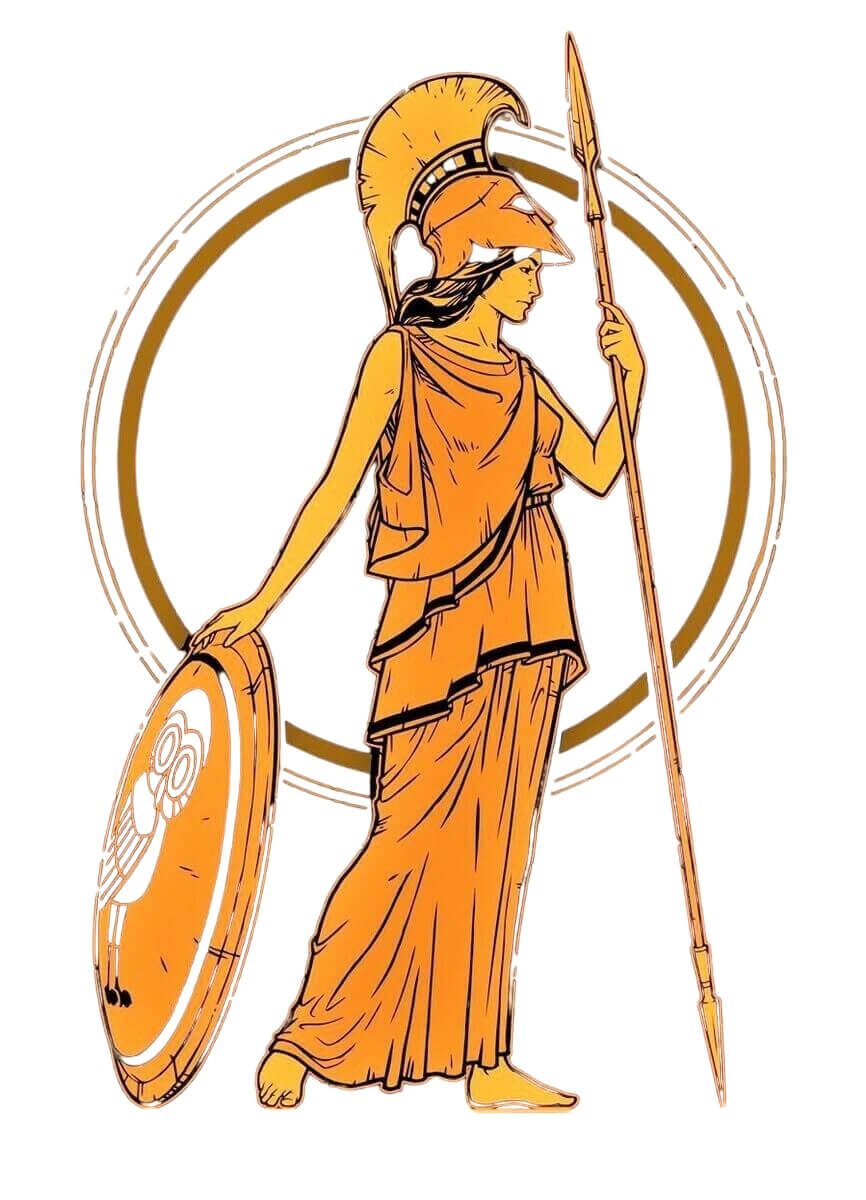Theseus: The political avenger of Greece
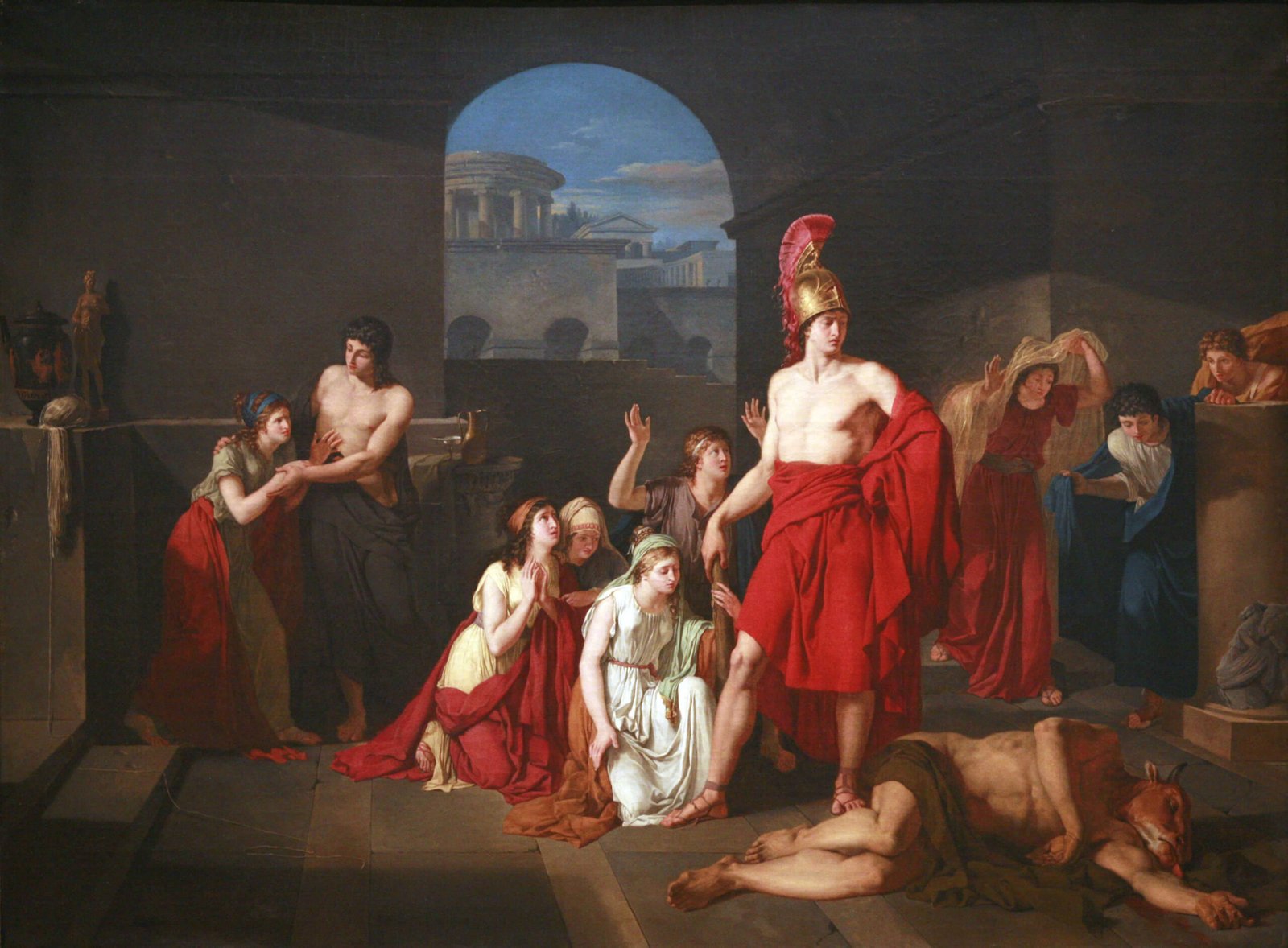
Theseus is the fabled hero from Greek Mythology, who slew the Minotaur of Crete and defeated the villains and creatures at the six entrances to the Underworld. He was the half-son of Poseidon, and half-son of Aegeus, the king of Athens. Athena, the goddess of wisdom had patronized him the most. His old father, the simple king, surrounded and deceived by political enemies, whom Theseus had slain alone, killed himself, jumping down from the cliff to the sea, when the hero did not change his black sails to white, on his way back to Athens.
The birth and first exploits of Theseus
One of the most famous Greek heroes was Theseus, the son of King Aegeus of Athens. While traveling, Aegeus lived for a short time in the small town of Troezen. He had a love affair with the princess of this city, named Aethra and left her pregnant. When Aegeus was asleep, Aethra had a prophetic dream about Athena, giving her instructions about her future son. The young princess, left her lover alone and went to the island of Sphaira, nearby the shores of Troezen.
In this place she made a libation to Sphairos and Poseidon, who possessed her mortal beautiful body. The next day Aegeus was leaving Troezen forever but did not want to take Aethra with him. Insomuch as his relatives in Athens were eager to seize the political power and could murder the princess. Before leaving Troezen, Aegeus had buried his sword and sandals under a huge heavy stone. Afterwards he had forewarned the princess, to make their son remove the rock and take his tokens. If he grew up so stronger and brave as him, he should travel to Athens to reclaim his birthright.
Very soon the princess gave birth to a mighty little boy. He had mortal and divine characteristics as well, which he inherited from Aegeus and Poseidon. Aethra called him Theseus. When he reached his adulthood, she revealed him who his father really was and led him to the secret place. Theseus easily lifted the stone, put on his father’s sandals, attached his awesome sword to the belt and set out for Athens.
Theseus and Six Labours
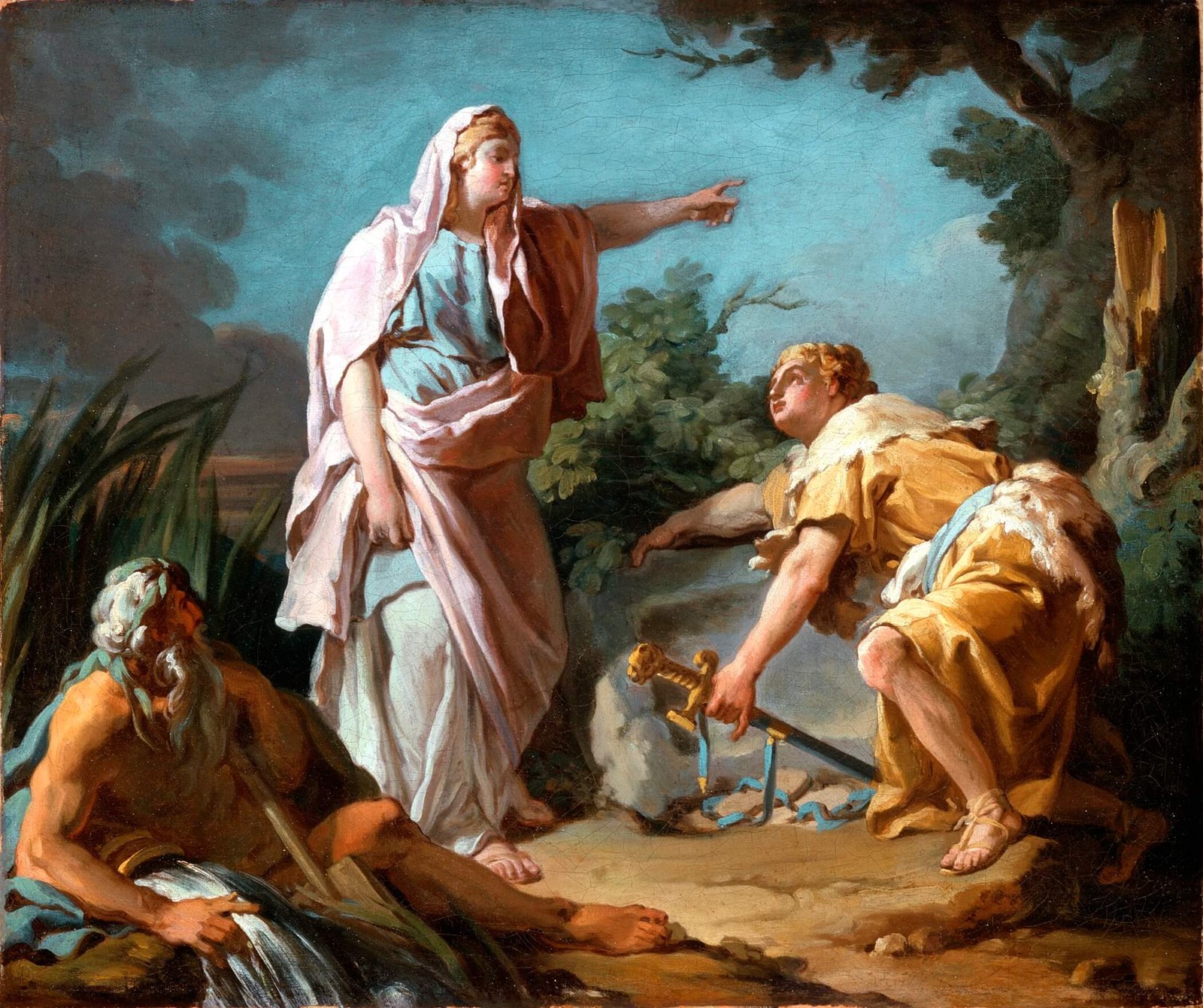
Eager to earn the reputation of a hero and grand slayer of villains Theseus didn’t go to Athens by sea. Instead, he had chosen the dangerous land-route along the six entrances to the Underworld.
Each one of these six gates were guarded by a wicked enemy, that had its special fashion to humiliate and kill the travelers on their way to Athens.
Periphetes, the Club-Bearer
Nearby the small city of Epiladrus, the bandit Periphetes had blocked the path to Athens. He used his bronze club to heat all the wayfarers, to insult and boast at them, while smashing their bodies. Theseus took his club out of his hands and did the same with him. It was the first time, when the legendary hero enjoyed the pleasure of slaying villains.
The robber Sinis
By the second entrance to the underworld, a robber, named Sinis used to capture his victims. He bounded them between two different pine trees, which had been bent down and a time after released with the purpose to tear apart the captives. Theseus enjoyed greatly this second humiliation. He had beaten the criminal frantically and did the same thing with his ugly weak body.
However, the hero had committed an improper act for a hero, seducing Sinis’s daughter and leaving her pregnant with a child.
Phaea, the Crommyonian sow
Not far away from Ishtmus, Theseus had slew the crazy wild pig, which used to attack everyone, passing through. It was enormous and fierce, but the hero didn’t hesitate a single moment and gave a deadly response to its dreadful harsh attack.
Sciron and the giant turtle
Nearby Megara, there lived another rogue, called Sciron. He had a special way to humiliate and kill the travelers. He was obliging them to clean his feet in a narrow cliff walk, blocking the path to Athens. Meanwhile the travelers knelt, he was throwing them down from the cliff where a giant turtle devoured them.
Theseus didn’t knee as the rest of people and hurled Sciron all the way down the mountain. Shortly afterwards the ugly turtle had eaten the criminal in the same way as all his faint-hearted victims.
Cercyon the wrestler
The king of Eleusis was challenging the wayfarers into a wrestling match and used to kill them after winning. Theseus accepted his offer for a fight, becoming anger because of such an injustice. Shortly afterwards he had beaten the king with astonishing rage. The overbearing brute felt every blow and punch, destroying his body and bones. Theseus had won him easily and killed him as well.
Procrustes’ Lodge
The most pathetic and despicable from the bandits along the road to Athens was Procrustes, accompanied by a band of brigands. He announced to travelers, that he would let them go, if they fitted in one of his beds. However, one of them was too short and another one two long. Thus, none of the travelers had the appropriate height and Procrustes used to kill them cutting off their feet or stretching their body.
When Theseus arrived to the place, Procrustes had mocked at him as well, offering one of the lodges. Nonetheless the hero understood his fiendish trick and went into rage, eager to slay the murderer. He put Procrustes in the short bed, slashing his feet with a single blow of an axe, and decapitating his body. It is unclear, what happened to the rest of the outlaws, thus Theseus killed them as well or made them run like cowards. Later he followed his path to Athens, without any other complications.
Theseus and his father
When Theseus arrived to Athens, after his perilous journey, his father did not recognize him, but he didn’t want to reveal his true identity. King Aegeus was already old, and the sons of his brother Pallas were intending to seize his power in Athens. On top of that his own son Medus had also aspired to overthrow him as the king of Athens.
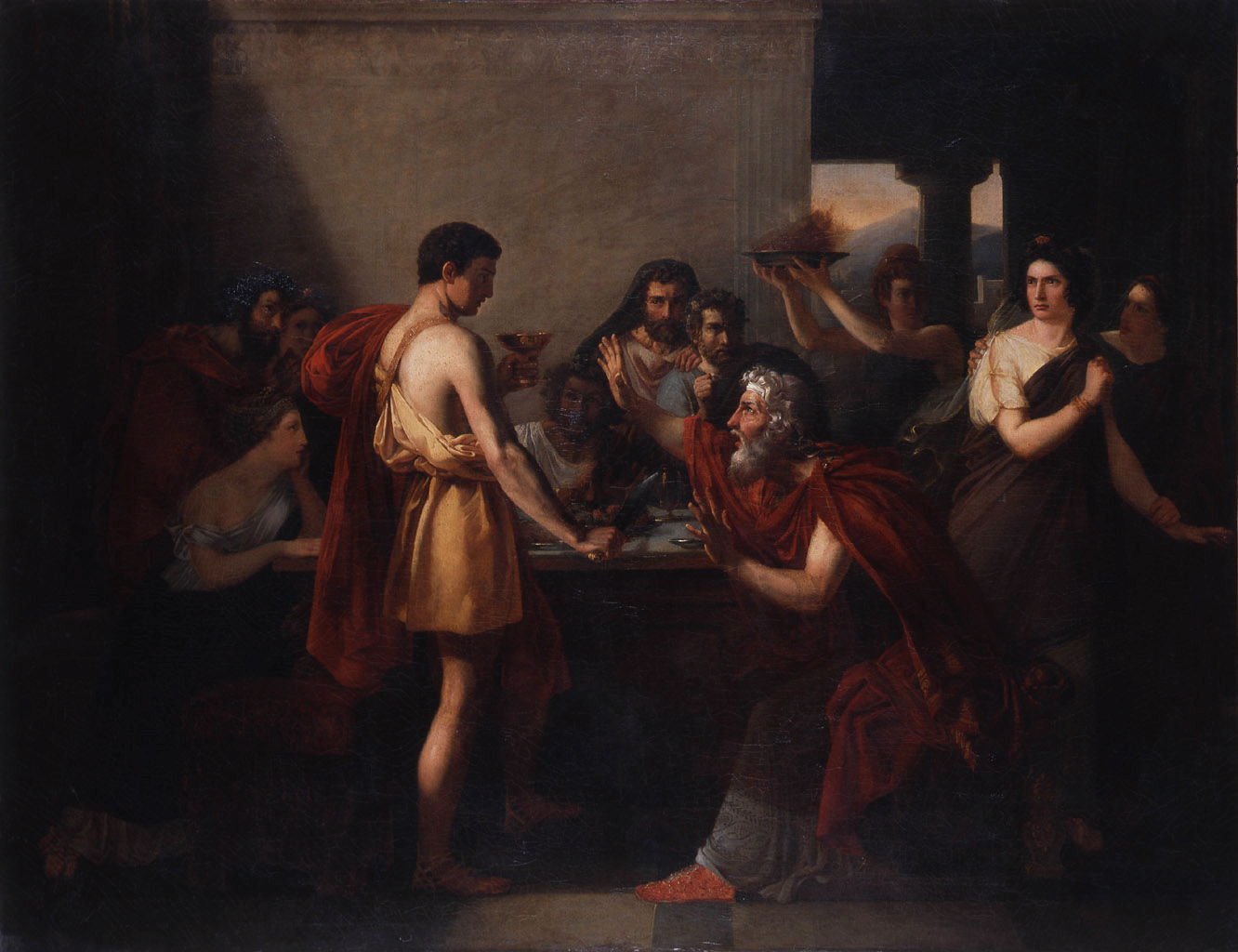
That being so, Media, the spouse of the king had identified Theseus as his illegitimate son. She feared him to be the heir to the throne, because of his might and heroic appearance. Thus, she tried to kill the brave hero, asking him to catch the Marathonian Bull, an insignia of Cretan power.
A short time afterwards, Theseus captured the bull and returned safe to Athens. Thereupon Medea tried to poison him during a pleasant meal with his father. However, when the food was served and the hero was about to drink from the cup of poisoned wine, Aegeus had recognized his sword and sandals. He threw away the cup with poison and embraced Theseus. Medea feared the wrath of the king and fled to Asia.
Theseus and the Pallantides
The fifty nephews of Aegeus had feared Theseus to be the new king of Athens. They hated the hero and had secretly planned to kill him and his father. With this intention they had plotted and prepared a big ambush outside the city. They had been waiting for the opportune moment to attack the hero and his guards. However, Theseus was informed of their cunning plan by a herald Leos and decided to act first.
He crept out of Athens at night and attacked the Pallantides in ambush by surprise, slaying them all at once. He didn’t need anyone to defeat his enemies. His might and prowess as a warrior was absolutely magnificent.
Theseus and the Minotaur
The people of Athens were overcome with great sadness at that time. Every nine years they had to send a bloody tribute to the Cretan king Minos. Seven boys and seven girls traveled to Crete to be devoured by the Minotaur. It was a fearsome monster with the torso of a man and the head of a bull, that dwelled in the terrible and confusing Labyrinth.
Thereupon the time of the unfortunate victims had come. They looked helpless and petrified, crying out over their young life. Theseus felt compassion for their suffering and volunteered to save them, saying that he would kill the fearsome creature.
Henceforth the young Athenians and the hero sailed to Crete. Usually the ship, that sailed there had a black sail as a sign of deep mourn. But this time Theseus took a white sail with him. He promised to use it by the time of his return to Athens, if his travel turned out to be successful.
Ariadne helps The Fabled Hero
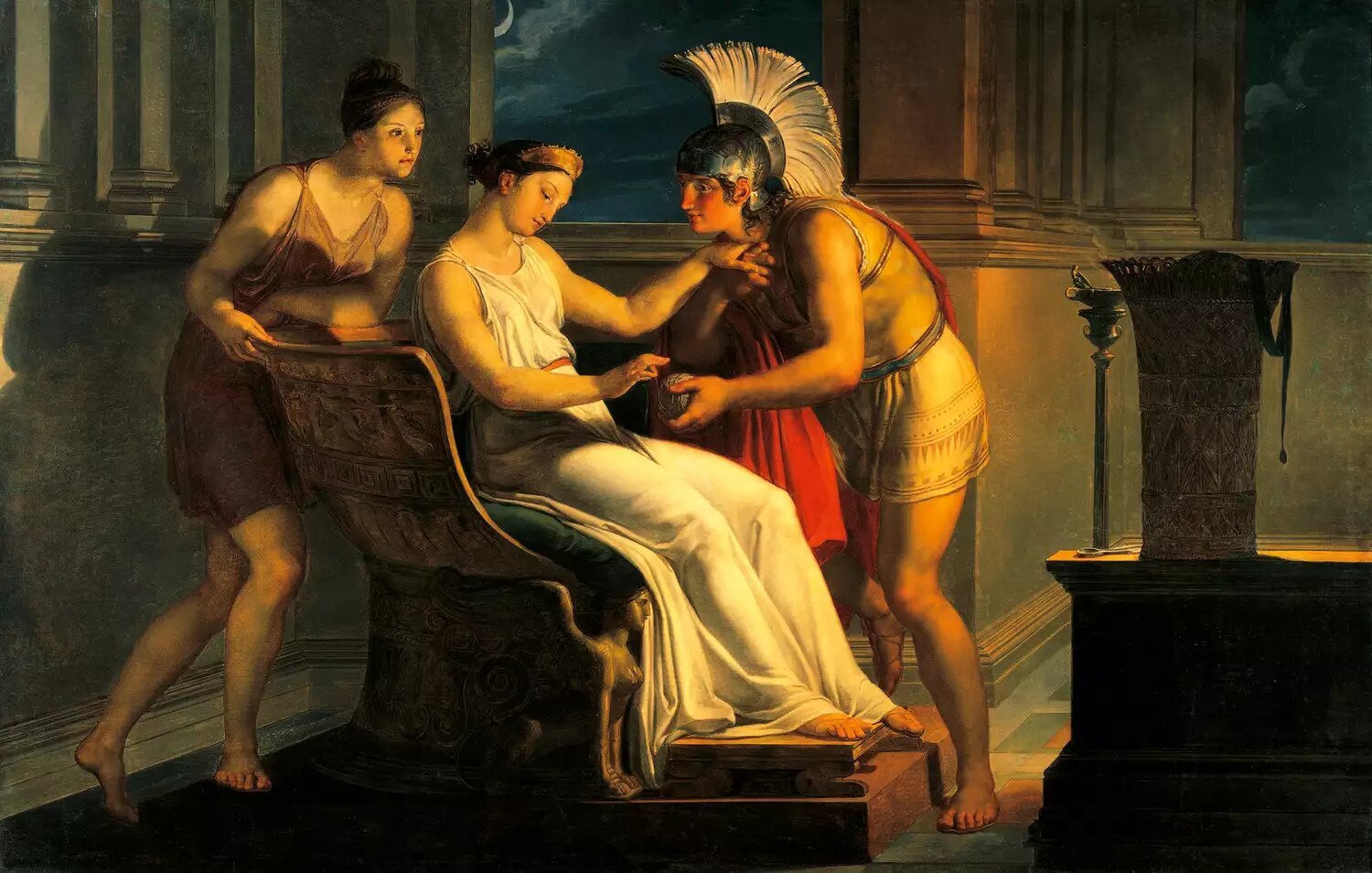
A time afterwards the ship reached the coast of Crete. Among the inhabitants who came to the sea to look at the beautiful captives stood the daughter of King Minos, called Ariadne. She saw the sad young men and women coming off the ship. Only Theseus was walking with his head up, looking all the way around. Ariadne’s heart burned with love for such a foreign young man. Thus, she decided to save him from the Minotaur’s terrible mouth. At night she sneaked to the dungeon, where the prisoners were locked up and brought a dagger to the Athenian hero.
On the other hand, the passages of the Labyrinth were very confusing and a man without previous knowledge could wander through them endlessly. No one knew how to find the way out. Thus, Ariadne came up with a trick. She convinced the master Daedalus to tell her the secrets of the Labyrinth he had built for the king. Thereupon she gave Theseus a ball of thread which he needed to tie at the entrance and follow in his way back.
Theseus kills the Minotaur
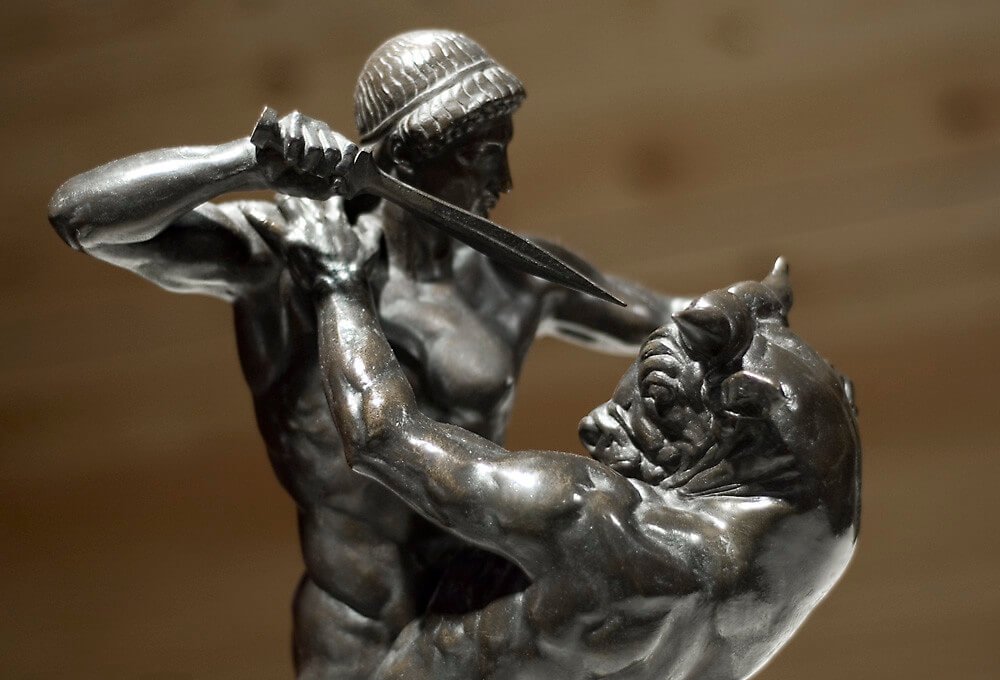
In the morning the unhappy prisoners went to the labyrinth. Theseus was the first to walk through the strange, doleful place, but the thread of the ball marked his path. For a certain time, Theseus wandered through the tangled, shadowy corridors, hearing a terrible roar ahead. It was the Minotaur, that felt the approach of a man and was eager to find him. Theseus hid behind a ledge of the wall and when the creature approached enough, he killed the monster with a quick sudden blow. With the help of Ariadne’s thread, Theseus found his way back and managed to get out from the terrible Labyrinth.
This same morning the ship set out on its journey of return to Athens. Joy overflowed in the hearts of the young Athenian hostages. In honor of the successful outcome, Theseus decided to anchor in the harbor of the island of Naxos, where he had abandoned Ariadne.
However, on his way back to Athens, Theseus had forgotten to change the sails to white, so that his old father could know he is alive. Aegeus stood day after day on the shore, on a high rock, gazing into the deserted surface of the sea. For sudden, a ship appeared on the horizon, but he could not differentiate clearly its sails in the distance. Then finally he had seen with horror, that they remained black. In despair, he threw himself off the cliff into the sea. Since that moment on, the Greeks called it the Aegean Sea.
The day when Theseus returned was both joyous and sad. The Athenians rejoiced merrily, when they learned of their great victory against the Minotaur and cried over the death of their king at the same time. Thereafter the ship, in which Theseus had returned, was kept in the Athenian harbor as a monument of great triumph.
The Meaning of Theseus

Theseus was the half-son of Poseidon, and half-son of Aegeus, the king of Athens. However, he grew up without his father and became a very strong warrior. That might be a reference to the way how must be educated the future politicians of Greece.
The public servant grows up as a half-son of the military institutions and half-son of Athens with its spirited inclination towards philosophy and science. Afterwards, Theseus makes his road to Athens, working in the hypothetical public enterprises, and becoming the best administrator in chief. He slays all the archons, at the entrances to Hades and results to be the best economist, inventor and organizer.
Thereupon Theseus is proposed for the democratic elections as the newest candidate for the leadership of the Greek Republic. People like his political program and ideas. They choose him between other candidates, because he is the best.
Henceforth Theseus begins to work with the council of Athena, during the next four years. The sails of Theseus are black (as the brave color of Athena’s anarchism) and his father, (not the council of philosophers) jumps down from the cliff, because the legendary hero does not change them to white, after his perilous adventure on Crete.
According to the legend, the hero is strong, intelligent and young. He is not born rich but becomes the best student in the educational system of Athens. Thereafter, he follows the path of political education and the leadership in state-owned enterprises. It permits him to be the perfect candidate for the presidency.
Threupon Theseus serves as the great political leader during the four or eight years of his democratic rule. In fact, he does an excellent work for the nation and people. Afterwards they change him for another Theseus, remembering the feats of mighty Perseus – the free warrior and philosopher, who fought and defeated archons in name of Athena.
